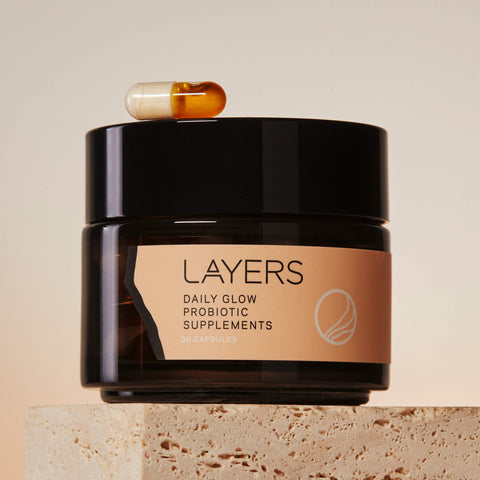Miss that youthful glow of your 20s? Ceramides are what you’re really missing. Here’s the most effective way to boost ceramide production and get your glow back.

When it comes to skin, fatty lipids are your friends. They help reinforce your skin’s ability to act as a protective force against the outside world. Perhaps the most important members of the lipid family are those special, skin-friendly agents called ceramides.
WHAT ARE CERAMIDES?
Ceramides make up nearly half of the components of your skin, which means they play a very important role in the barrier function of the skin microbiome. They’re essentially a type of fat that helps hold your skin cells together, and they’re found on the outermost layer of the skin called the stratum corneum.
WHAT DO CERAMIDES DO?
In addition to keeping your skin hydrated and protected, ceramides also aid in repairing skin if it has been damaged in some way. If you’ve spent too long out in the sun, ceramides work to help repair that UV damage. They also recalibrate your skin when it’s stressed out. This can happen if you use harsh skincare products or undergo a skin treatment that is too aggressive. In a nutshell, ceramides help restore your skin barrier to its natural state if it gets stressed. But that’s not all they do.
CERAMIDES AND ANTI-AGING
If you’ve been dabbling in the world of anti-aging skincare, you’ve definitely heard of retinol, niacinamide, and peptides. These are all great tools to help keep your skin looking youthful. But none of them come close to the power of ceramides.

Ceramides are important because they hold onto the water naturally present in our skin. By doing so, they fight against transepidermal water loss. Water loss is what makes lines and wrinkles more visible. If you think about the deep cracks that result from a dry piece of land, your epidermis acts in the same way as hay or mulch. It protects the soil, keeping it moist and preventing the sun from evaporating the water. The water is stored in those pieces of hay or mulch. Ceramides are similar in that they provide spaces for water to hide and be protected. When that protective layer is there, you lose less water, so those cracks are less visible.
The quantity of ceramides our bodies produce decreases as we age, which is why our skin wrinkles and sags. So by supplementing with ceramides, we can give our bodies greater capacity for retaining moisture and protecting our skin health.
DO CERAMIDES WORK?
The answer science provides is a resounding, “Yes!”. Studies on the subject are increasing, providing more evidence for the efficacy of ceramide supplementation. The question then is how you get them, ensuring that they are bioavailable so that your body can actually benefit.
HOW TO GET MORE CERAMIDES
Aside from the ceramides that are naturally produced in the body, you can boost ceramide production through two mechanisms: internal and external.
Internal: You can consume ceramides by eating certain foods, and diet is very important when it comes to your skin. Consume a diet rich in essential fatty acids by incorporating soybeans, wheat germ, dairy, and vegetables like sweet potatoes and corn.
External: Ceramides are buzzing in the skincare world, so it’s never been easier to find products that contain them. Moisturizers, serums, and creams are often infused with either synthetic or plant-derived ceramides. You can also take supplements that contain ceramides to boost ceramide production.
TOPICAL CERAMIDES VERSUS ORAL CERAMIDES

There is increasing evidence to support the use of oral ceramides over topical application. The ability of your body to absorb the supplement boosts the chances that your skin will benefit from it. This is referred to as bioavailability. With an oral supplement, the bioavailability aspect of a product tends to be more targeted than what’s typical for a topical application.
The molecular weights of topical products need to be small enough to penetrate the skin barrier. When it comes to topical ceramides, science demonstrates that this low molecular weight isn’t easy to achieve. One study stated that “Due to high molecular weight, percutaneous absorption of ceramides is also a controversial debate. Ceramides are very hard to pass through the layers of the skin.” Therefore, oral ceramide supplements are more likely to be effective due to their bioavailability.
One of the most commonly researched forms of ceramides is derived from wheat. One study provided participants with oral wheat-derived ceramides over 60 days. One group was given ceramides in powder form, another in liquid form, and the final group was given a placebo. The two groups who took the supplement noticed significant improvements, noticing significantly increased skin hydration, elasticity, and smoothness. They also saw decreased transepidermal water loss and a reduction in the appearance of wrinkles.
HOW DO ORAL CERAMIDES WORK?
If you’re looking for a simple, scientifically proven way to combat the visible effects of aging, an oral ceramide supplement can offer real results. When ceramides are taken orally, they are digested at the intestinal level. The components of the supplement are then absorbed into the bloodstream, delivering them directly to the skin.
Layers Daily Glow Supplements combine powerful probiotics with Ceramosides, a wheat-based ceramide complex that is specially formulated for bioavailability. In clinical trials, results demonstrated that after only 15 days, Ceramosides improved skin Moisturization Index by 16%, and after 60 days, by 21%. Oh, and the added bonus was a marked improvement in hair strength and growth. Not bad for a once-a-day probiotic!
Ceramides are a fundamental part of good skin health. And because we know they slow down production as we age, supplementing them is an easy way to ensure your skin gets what it needs to stay healthy and look and feel radiant. So give it a try and see the results for yourself! The science doesn’t lie…and neither does the mirror. Are you ready to see what oral ceramides can do for your skin?

